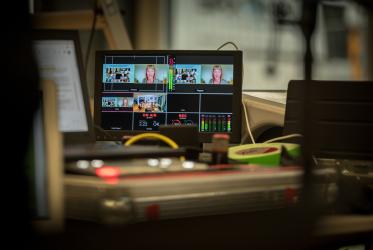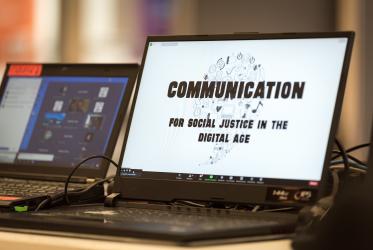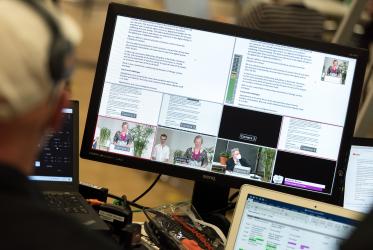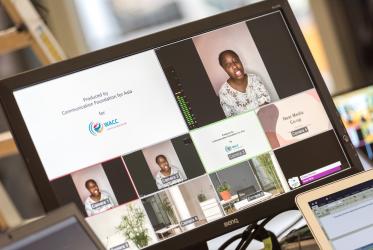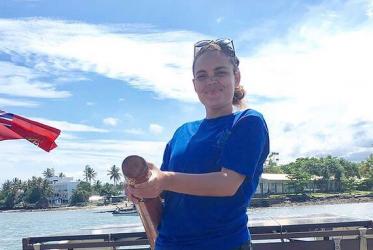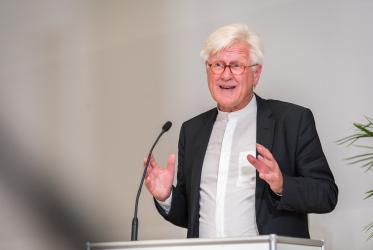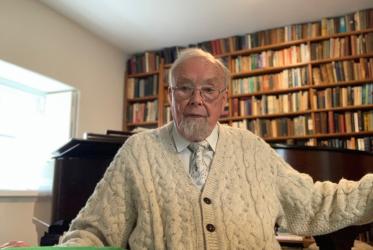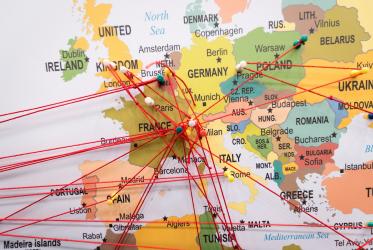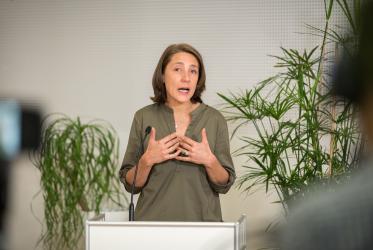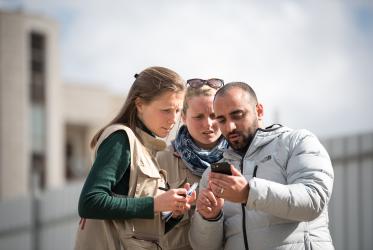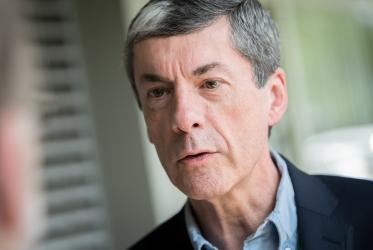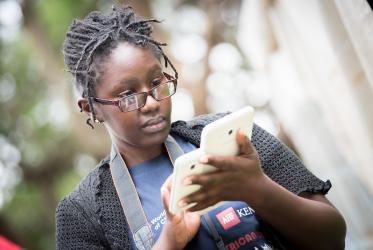La comunicación para la justicia social en la era digital
- Sobre nosotras
- Programa del día 1: Justicia digital
- Programa del día 2: Espacio público
- Programa del día 3: Visión
- Speakers
- Recursos y Estudios de casos
¿Qué formas adoptan la justicia social y la injusticia social en la era digital, especialmente para las personas y comunidades marginadas?
¿De qué manera ha transformado la era digital la noción de espacio público?
¿Qué visión tenemos de una sociedad digital -y humana- más justa, y cómo podemos contribuir a hacerla realidad?
Estas fueron algunas de las cuestiones abordadas en el simposio internacional “Comunicación para la justicia social en la era digital”, celebrado del 13 al 15 de septiembre de 2021.
El simposio se centró en el impacto de la transformación digital en las comunidades y sociedades. Mediante presentaciones, estudios de caso y debates, se examinaron los desafíos de la comunicación digital para la justicia social, y se identificaron oportunidades para llevar a cabo acciones colaborativas y coordinadas entre las organizaciones religiosas, la sociedad civil, las instituciones académicas, las empresas tecnológicas y los medios de comunicación.
El simposio concluyó con la publicación de un manifiesto en el que se recogen una serie de principios para promover una comunicación socialmente justa y un llamado a impulsar un “movimiento transformador” basado en los derechos humanos, la dignidad de las personas y los valores democráticos.
Manifiesto del simposio “Comunicación para la justicia social en la era digital”
El simposio fue organizado por el Consejo Mundial de Iglesias y la Asociación Mundial para la Comunicación Cristiana. Entre los coorganizadores, figuraron Brot für die Welt (Pan para el Mundo), la Iglesia Evangélica en Alemania, la Asociación de Iglesias y Misiones Protestantes en Alemania (EMW, por sus siglas en alemán) y la Federación Universal de Movimientos Estudiantiles Cristianos (FUMEC).
El evento reunió investigaciones, experiencias de diferentes regiones y comunidades marginadas, aportaciones de expertos sobre tendencias económicas y políticas, y reflexiones éticas y teológicas.
El simposio y el manifiesto forman parte de un proceso continuado de reflexión y debate sobre la justicia social en la era digital que incluirá un plan de acción concreto y una contribución a la 11ª Asamblea del CMI que tendrá lugar en Karlsruhe en 2022.
Pregunta principal: ¿Cómo son la justicia social y la injusticia social en la era digital, especialmente para las personas y comunidades marginadas?
Consulte los recursos de los antecedentes para el día aquí
Sesión de la mañana
Palabras de bienvenida
Rev. Prof. Dr. Ioan Sauca, Secretario General Interino, Consejo Mundial de Iglesias
Dra. Dagmar Pruin, Presidente, Brot für die Welt
Presentación principal del simposio y discusión
“Comunicación para la Justicia Social en la Era Digital”
Dra. Ellen Ueberschär, Presidente, Fundación Heinrich Böll
Video de animación sobre justicia digital
Presentación del tema del día y su estructura
Moderadores:
Christina Biere, pastora
Rev. Nick Elorm Ahialey-Mawusi, pastor y doctorando
Presentación principal sobre justicia digital
Heinrich Bedford-Strohm, Obispo de la Iglesia Evangélica Luterana en Baviera
Entrevistadas:
Erin Green, Ph.D., Teología e Inteligencia Artificial
Sarah Macharia, Ph.D. Administradora del Programa Género y Comunicación, Asociación Mundial para la Comunicación Cristiana
Sesión de la tarde
La justicia social en acciones y palabras
Exploración de las declaraciones y conceptos existentes que tienen un impacto sobre la comunicación digital y presentación de un esbozo de la discusión del simposio.
Justicia digital: Estudio de casos y buenas prácticas
Esfuerzos comunitarios para abordar los problemas principales de justicia digital en su contexto – Presentaciones y preguntas y respuestas.
• IT for Change (TI para el Cambio), India
• Computer Professionals Union (Sindicato de Profesionales de la Informática), Filipinas
• Community Media Centre (Centro Comunitario de Medios de Comunicación), Palestina
Club de prensa: Instrumentos digitales– ¿bendición o maldición? (ver la grabación)
Pregunta principal: ¿De qué maneras la era digital ha cambiado nuestra noción del espacio público?
Consulte los recursos de los antecedentes para el día aquí
Sesión de la mañana (ver la grabación)
Palabras de bienvenida
Pastor Rainer Kiefer, Secretario General, Asociación de Iglesias Protestantes y Misiones en Alemania (EMW)
Presentación principal y discusión
Moderadora, Sra. Casey Harden, Secretaria General, YWCA Mundial
Video de animación sobre espacio público
El estado del “espacio público” digital
Hon. Emma Theofelus, Viceministra, Ministerio de Tecnologías de la Información y Comunicaciones, Namibia
Goran Buldioski, Director, Oficina de Berlín, Open Society Foundations,
Entrevistada:
Frederike van Oorschot, Instituto Protestante para la Investigación Interdisciplinaria
Sesión de la tarde
Crear espacios de comunicación públicos democráticos
Moderador: Embert Charles, Presidente de la Asociación Mundial para la Comunicación Cristiana
Espacio público: Estudio de casos y buenas prácticas
Esfuerzos comunitarios para abordar los problemas de espacio público en su contexto – presentaciones y preguntas y respuestas
• ALAI, América Latina (Ecuador)
• Ideosync, India
• Berea Project, Brasil
Encuentro para la justicia digital
Explorar de manera interactiva las maneras para hacer frente a la injusticia digital.
Pregunta principal: ¿Qué visión tenemos de una sociedad digital más justa – y humana – y cómo ayudamos a conseguirla?
Consulte los recursos de los antecedentes para el día aquí
Sesión de la mañana (ver la grabación)
Moderadora: Christine Gebauer, presidenta, FUMEC - Europa
Palabras de bienvenida
Philip Lee, Secretario General, WACC
Video de animación sobre la visión de nuestro futuro digital
Nuestra visión del futuro
Marcelo Leites, Secretario General, Federación Cristiana Mundial de Estudiantes
Entrevistadas:
Tijana Petkovic, Iglesia Ortodoxa de Serbia, Foro Ecuménico de Mujeres Cristianas Europeas
Prof. Anita Cloete, Universidad de Stellenbosch
Perspectivas intergeneracionales de nuestro futuro digital
Sesión de la tarde
Moderadora: Rev. Dra Angelique Walker-Smith, miembro del Comité Central del CMI
Plenaria: Discusión abierta
• ¿Cuáles son los retos principales para la justicia en las sociedades digitales?
• ¿Cuáles son los desafíos para las iglesias y agencias?
• ¿Cuál es el papel del estado para la implementación de sociedades justas e inclusivas?
• ¿Cómo se puede mejorar el diálogo entre las comunidades religiosas, las redes de la sociedad civil y las grandes empresas de tecnología?
Plenaria: Nuestro mensaje y nuestro plan de acción
Resumen del simposio por relatores y presentación del borrador del mensaje y del plan de acción.
Discusión de la continuación del proceso.
Palabras de clausura: Dra. Agnes Abuom, Moderadora, Comité Central del CMI
Presentación de diapositivas de la sesión plenaria de clausura (ver el vídeo)
Speakers

Ellen Ueberschär, president, Heinrich Böll Foundation
Since July 2017, Ellen Ueberschär is, along with Barbara Unmüßig, one of the presidents of the Heinrich Böll Foundation. As president of the foundation, she is responsible for the foundation’s domestic policy department, for foreign and security policy, and for the European Union/North America department. In addition, she is in charge of the scholarship department, the Green Academy—a think tank of scholars and politicians—as well as the research archive “Grünes Gedächtnis” (Green Memory Archive). Between 2006 and 2017, she was the secretary general of the German Protestant Church Assembly (Deutscher Evangelischer Kirchentag). In this function, she coordinated six Protestant Church Congresses and one ecumenical one. Before, the ordained pastor was dean of the study program for theology, ethics, and law at the Evangelische Akademie Loccum.
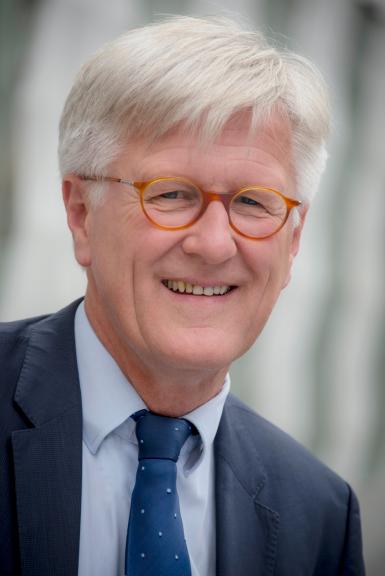
Bishop Heinrich Bedford-Strohm, Evangelical Lutheran Church in Bavaria
Heinrich Bedford-Strohm was born in 1960 and studied Theology in Erlangen, Heidelberg and Berkeley (USA). From 1989 to 1992 he was a teaching assistant at the Chair of Systematic Theology and Social Ethics at Heidelberg University where he earned his doctorate in 1992. By 1995 he was married, and the father of three sons. In that year he accepted a Dietrich Bonhoeffer guest professorship for Social Ethics at Union Theological Seminary in New York. In 1998 he was granted his ‘habilitation’ (enabling eligibility for a full professorship) at Heidelberg University. From 1999 to 2001 he had an acting professorship for Systematic Theology at Giessen University. From 2004 to 2011 he was professor of Systematic Theology and Current Theological Issues. He headed the Dietrich Bonhoeffer Research Centre for Public Theology at Giessen University from 2007 to 2011 and was also dean of the Faculty of Humanities from 2006 to 2011.
Since 2009 he has been extraordinary professor at Stellenbosch University in South Africa and since 2011 honorary professor for Systematic Theology and Current Theological Issues at Bamberg University. Bedford-Strohm gathered experience as a parish minister from 1992 to 1994 as an assistant pastor from Bavaria loaned to the Protestant congregation of Heddesheim (Baden). He also served as a pastor from 1997 to 1999 and from 2001 to 2004 at the Moriz Church in Coburg. He is a member of the Society for Protestant Theology and is on the board of the journal “Evangelische Theologie”, having been its CEO until 2011. Since 30 October 2011 Bedford-Strohm has been bishop of the Evangelical Lutheran Church in Bavaria and since 11 November 2014 chair of the Council of the Evangelical Church in Deutschland.
Respondents

Erin Green, researcher and activist
Erin Green, PhD, is a Canadian-Belgian researcher and activist working in the area of AI, democracy, and the militarisation of digital technologies. She is lead editor of an upcoming collection on AI ethics and higher education. Erin’s interdisciplinary work draws on her training in science, theology, philosophy, and communications to develop a novel interdisciplinary approach to historical, ecological, and social impacts of AI and robots. Erin also has over 15 years experience working in communications in the NGO sector and is dedicated to ecological and social justice as an expression of faith. She loves biking.

Sarah Macharia, programme manager for Media and Gender Justice, World Association for Christian Communication
Sarah Macharia coordinates the Global Media Monitoring Project (GMMP), a transnational longitudinal research and advocacy initiative for gender equality in and through the news media running since 1995. She is the editor of the Who makes the news? The Global Media Monitoring Project reports 2010-2020 and co-editor of the UNESCO-published Setting the gender agenda for communication policy (2019). Sarah holds a PhD in Political Science and has worked extensively with feminist movements worldwide.
Moderators
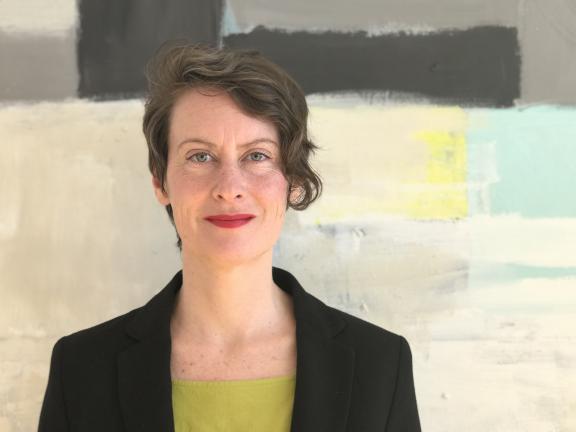
Christina Biere, pastor, Evangelical Church of Westphalia
Christina Biere is a professional in theology and pastoral care with 20 years of experience in inter-church dialogue and international collaboration. Biere was working in different church congregations before moving towards project leadership with a focus on digital ecumenism, international affairs, diversity and inclusion, and critical analysis of racism and whiteness for the Evangelical Church of Westphalia in Germany. Between 2006 and 2013 she was a member of WCC’s central committee and its Commission on Youth.
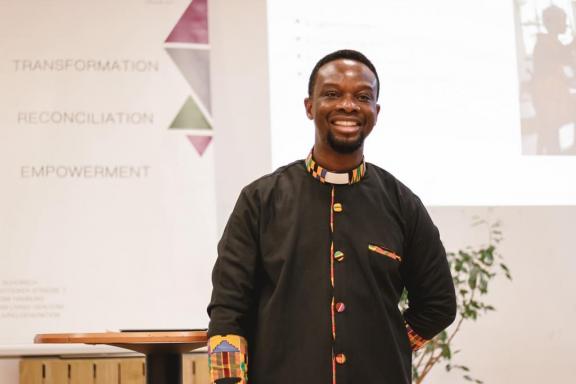
Elorm Nick Ahialey-Mawusi, founder and leading pastor, Living Generation Church, Hamburg
Elorm Nick Ahialey-Mawusi is a doctoral student in the department of Theory of Religion, Ecumenical and Interreligious Dialogue of the Philosophical Faculty at the Rheinische Friedrich-Wilhelms-University of Bonn in Germany. With a special interest in the field of Post-Migration Churches as Agents of Theological Knowledge Production, Ahialey-Mawusi researches theTranscultural Functions of Theology in Negotiations with a special focus on the Cultural Dual Belonging of the Second Generation German Protestants of African Heritage. He has published numerous articles on topics in ecclesiology, ecumenical theology, intercultural theology, mission and diakonia.
Ahialey-Mawusi holds a MA in Extended Ecumenical Studies at the University of Bonn and a BA in Mission Studies and International Diakonia from the University of Applied Sciences for Intercultural Theology, Hermannsburg (Germany). He holds a ‘Diplom der Missionsakademie’ from the Academy of Mission at the University of Hamburg. Nick is founder and leading pastor of the Living Generation Church in Hamburg, and the director of the Center for Theological and Ministerial Formation-Germany.
Speakers

Honourable Emma Inamutila Theofelus, deputy minister of Information, Communication and Technology, Government of Namibia
Before her government appointment, Honourable Emma Inamutila Theofelus was a youth activist around issues of gender, children’s rights, sustainable development and youth unemployment. She served as deputy speaker of the Youth Parliament of the Republic of Namibia and the Junior Mayor of the City of Windhoek, amongst other roles.
Hon. Emma holds an LLB Honours Degree from the University of Namibia, a diploma in Business Management from Amity University and a diploma in Afrikan Feminism and Gender Studies from the University of South Africa.
In her role as deputy minister and member of parliament, Hon. Emma plans to better communicate the activities and programs of the Government of the Republic of Namibia and assist in preparing the Namibian nation for the 4th Industrial Revolution.

Goran Buldioski, director, Open Society Initiative for Europe
Goran Buldioski is director of the Open Society Foundations’ Berlin office and the Open Society Initiative for Europe.
Buldioski’s areas of expertise include democratic transition, civil society, citizen participation, and effective government in Europe, notably Central and Eastern Europe and the Western Balkans. Before joining the Open Society Foundations, he worked for the Council of Europe, the Macedonian Center for International Cooperation, and the National Youth Council of Macedonia. Buldioski’s publications on democracy, think tanks, and policy-relevant issues have appeared in Politico Europe, Foreign Policy, ZEIT Online, openDemocracy, Mediapart, and the Independent, among others. He is member of the European Council of Foreign Relations.
Buldioski holds MA degrees in public policy from Central European University and in organizational behavior from George Washington University.
Respondent

PD Dr. theol. Frederike van Oorschot, department head, Religion, Law and Culture, Interdisziplinary Research Institute, Heidelberg
PD Dr Frederike van Oorschot* studied protestanti theology in Göttingen and Heidelberg. During her PhD on public theology and globalisation she did research in Princeton and Stellenbosch. She worked as a lecturer and theological staff of the bishop of the Protestant Church in Baden. Her research interests are digital theology, public theology and hermeneutics. She is head of the department Religion, Law and Culture at the Interdisziplinary Research Institute Heidelberg.
* PD, or ”Privatdozent,” designates scholars who are allowed to teach at universities after their “Habilitation," or second doctorate.
Moderators
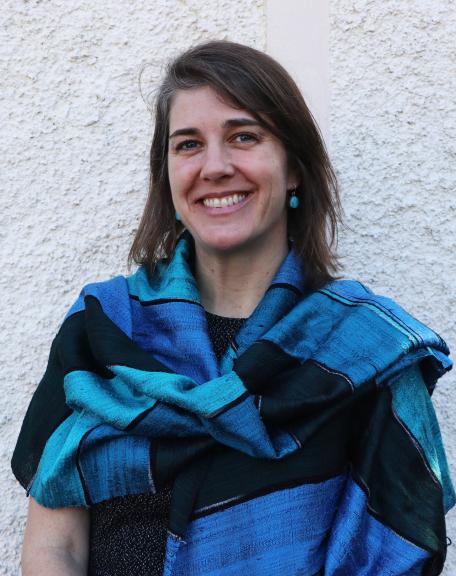
Casey Harden, general secretary, World YWCA
Casey Harden joined the YWCA movement 20 years ago and is herself a testament to the YWCA’s mission to create space for young women to be leaders, and in doing so, define and contribute to gender equality.
She joined the World YWCA in 2018 as the deputy general secretary and in January 2019 was appointed as the 15th general secretary. Through various executive and leadership positions, Harden has worked in the local and national sphere on issues around health and wellness, gender-based violence, economic security, racism and social justice, while growing into a professional adept at administration, strategy, governance, and activism. Harden has shown how to harness a movement that is rich and wide-reaching in its diversity toward a common goal for collective impact.
An aspiring astronaut, proud mama, and YWCA torchbearer who is passionate about the simple joys of life, Harden believes that young women and girls will lead the way in realizing the global goal of leaving no one behind.
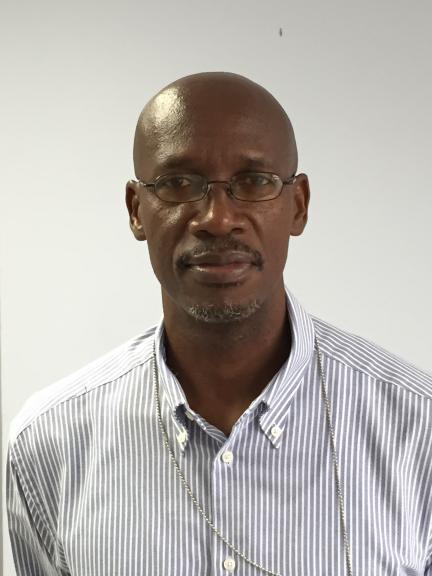
Embert Charles, communication and media specialist; President, World Association for Christian Communication (WACC)
Embert Charles, is an experienced communication and media specialist from Saint Lucia, West Indies, and is currently President of WACC. He worked with civil society grassroots organizations in the eastern Caribbean for over two decades focusing on cultural research and advocacy, nation languages and popular communications. Charles has held senior managerial and leadership positions in the public sector, including Managing Director of the Eastern Caribbean Telecommunications Regulatory Authority (2008-2017) Executive Director of the Folk Research Centre. Previously, Director of Information Services with the government of saint Lucia, and Communications and Public Awareness Consultant for the Organization of Eastern Caribbean States (OECS). His published works focus on to communications, telecommunications, media development and culture He holds a Masters degree in Telecommunications Regulation and Policy from the University of the West Indies, Jamaica, and an MPhil in Development Studies from the University of Sussex, United Kingdom.
Speakers

Marcelo Leites, general secretary, World Student Christian Federation
Leites is from Uruguay. He comes from a long history of involvement with the Student Christian Movements in Uruguay and World Student Christian Federation (Latin America and the Caribbean). He was regional secretary for Latin America and the Caribbean from 2012 and director for the World Student Christian Federation’s Global Program on Ecological Justice since 2016. Prior to this, he was a member of the Student Christian Movement of Uruguay from 2005 to 2011. He worked as a social educator, campaigner and accompanier for youth-related programs and projects in Montevideo, Uruguay before joining the World Student Christian Federation as the interim regional secretary for Latin America and the Caribbean in 2011. Leites studied social work for two years and philosophy for four years at the Universidad de la República in Montevideo, Uruguay, and graduated in 2011. He has been involved in climate justice advocacy since 2012 and is a member of the WCC Climate Change working group and the ACT Alliance Climate Justice Group.
As general secretary for the World Student Christian Federation, he coordinates and provides overall leadership to the work of the federation. He is responsible for the organization’s consistent achievement of its mission and objectives, in global programme development and administration.
Respondents

Tijana Petkovic, Ph.D. student, University of Tübingen
Tijana Petković is a theologian who finished her Bachelor's and Master's program at the Faculty of Orthodox Theology, University of Belgrade. She then studied at the Ecumenical Institute in Bossey, University of Geneva, and also spent two semesters as Erasmus Student at the Friedrich-Alexander University Erlangen-Nürnberg.
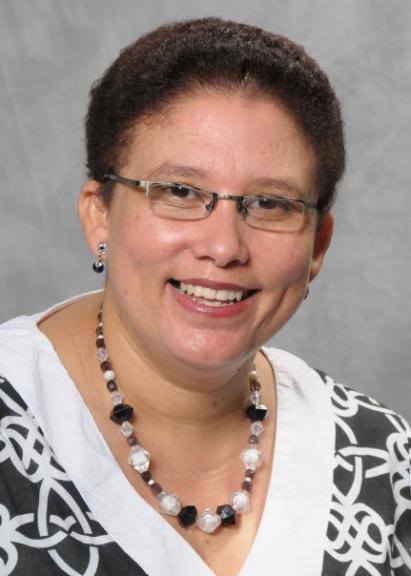
Prof. A.L. Cloete, asociate professor, Faculty of Theology, Stellenbosch University
Anita Cloete is an associate professor at the Faculty of Theology, Stellenbosch University. She has teaching experience of about 17 years and successfully supervised several postgraduate students. Her research areas are spirituality, youth work/ministry within congregational contexts and religion and media.
Her latest publications include: 2020. Living in a Digital Culture: The Need for Theological Reflection. Ecumenical Review: World Council of Churches. 72 (2) 255-269. 2019. Unstoppable: A critical reflection on the socio-economic embeddedness of technology and the implications for the human agenda. HTS Theological Studies. 75 (2) 1-8. 2019. Interdisciplinary Reflections on the interplay between Religion, Film and Youth. (ed) Stellenbosch: Sun Press. 2017. Film as medium for meaning making: A Practical Theological reflection. HTS Theological Studies. 73(3) 1-7
Moderators

Rev. Dr Angelique Walker-Smith, senior associate for Pan African and Orthodox Faith Engagement, Bread for the World
Rev. Dr Angelique Walker-Smith is senior associate for Pan African and Orthodox Faith Engagement at Bread for the World in Washington D.C. She brings global, national and local experience as a faith thought leader, journalist, speaker, preacher and author. President Clinton, Senator Richard Lugar, former Indiana Governor (VP) Mike Pence and two of her alma maters, Yale Divinity School and Kent State University have awarded her with high distinctions of leadership. She received her doctorate degree from Princeton Theological Seminary and is former executive director/minister of the Church Council in Indianapolis, Indiana, is ecumenical liaison/officer for the National Baptist Convention USA, Inc., a WCC central committee member and rapporteur of the related communications committee, Governing Board member of the National Council of Churches in the USA, WCC-Ecumenical Theological Education commissioner and a president of Historic Black Churches at one of the widest represented ecumenical bodies of Christianity in the USA, Christian Churches Together. She is also the international convener for the Africans and Africans in Diaspora-Manchester Conference, convener of the Pan African Working Group for the Advocacy for Africa Network in Washington D.C., and convener for the Pan African Women’s Ecumenical Empowerment Network-WCC. Most recently, she was selected to be a member of the Preparatory Working Group for the new UN Permanent Forum of People of African Descent.
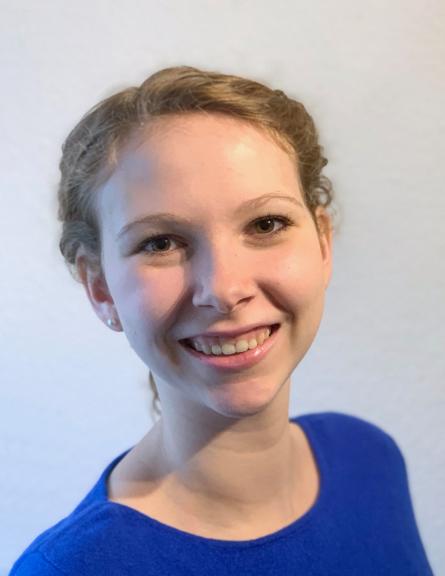
Christiane Gebauer, chairperson, World Student Christian Federation-Europe
Christiane Gebauer is chairperson for the World Student Christian Federation-Europe Region, and is also studying theology. Gebauer joined the World Student Christian Federation in 2016 and served from 2017 as programs coordinator, organizing conferences on issues of social justice, peacebuilding and youth leadership as well as media literacy all across Europe. Since 2019 she has served as chairperson of the European region, responsible for the strategic development as well as networking and team management. As a theologian, Gebauer studied in Jena, Pretoria, Vienna and Goettingen and found her fields of interest in reconciliation studies, ecumenism, digital and feminist theology.
Panelists

Sarah de Roure, Latin America feminist and ecumenical activist, international development consultant
Sarah de Roure has more than 15 years of practice in strategizing and leading organizational change to promote gender equality in Brazil and Latin America. She has extensive experience working alongside civil society organizations, non-governmental organizations, social movements, local governments, universities and vulnerable communities on communicating, planning, campaigning and grassroots advocacy—both as a leader and expert consultant.

Lorenzo Vargas, program manager, Communication for Social Change
Lorenzo Vargas is a communication for development specialist and researcher on citizens’ media. A Colombian-Canadian, he directs WACC’s Communication for Social Change Program, which supports grassroots sustainable development initiatives in the Global South. He holds degrees in international development and communication from York University and McGill University, and is pursuing a PhD in Communication and Culture at Ryerson University, where he is affiliated with the Global Communication Governance Lab. He has also pursued studies on media and internet policy at DiploFoundation, the University of Brasilia and the University of Oxford.
His publications include Citizen’s Media as a Tool for the Local Construction of Peace in Colombia (2013); Indigenous Community Media Aid Reconciliation in Canada (2015); and Expanding Shrinking Communication Spaces (ed. with Philip Lee) (2020). Staff liaison for the WACC Caribbean and WACC Asia Region, he speaks Spanish, English, and French.

Rev. James Bhagwan, general secretary, Pacific Conference of Churches
Husband to Maelin and father to Francisco and Antonia, Rev. James Bhagwan is from Fiji.
Bhagwan is an ordained minister of the Methodist Church in Fiji and is also licensed to preach and celebrate the sacraments in the Anglican Diocese of Polynesia. He currently serves as general secretary of the Pacific Conference of Churches.
Previously he served as the secretary for Communication and Overseas Mission as well as theological college staff and pastoral work in the Methodist Church in Fiji. Prior to entering the ministry, he worked in the radio and television broadcast industries in Fiji (1992 - 2006) and had a regular weekly column in the Fiji Times newspaper for a decade (2008-2017).
He is a passionate advocate for ecological stewardship and climate justice, with particular focus on care for the ocean, gender justice, and self-determination issues. Bhagwan is also a keen stand-up-paddler and long-time volunteer chaplain and crew member of the Fijian traditional voyaging canoe, Uto Ni Yalo.
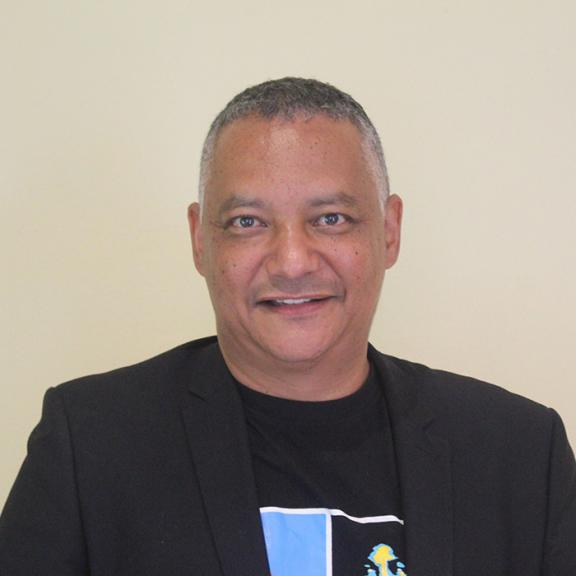
Ashley Green-Thompson, coordinator, The ACT Ubumbano
Ashley Green-Thompson is coordinator of The ACT Ubumbano, a network of Southern African and European organisations working for economic, gender and environmental justice. Green-Thompson has extensive experience in the region doing work in the nonprofit sector that is rooted in a commitment to social justice activism. He has worked across sectors, from the nascent electoral processes of 1994 through formal church structures and in philanthropy. Green-Thompson has a Bachelor of Arts Degree in African Politics and Law.

Rev. Meelis Süld, Outreach coordinator for the Council of Lutheran Churches in Great Britain, assistant to the Bishop in the Lutheran Church in Great Britain
Rev. Meelis Süld has been a religious radio journalist for more than two decades in Estonian Public Broadcasting. Since 2021 he works as the outreach coordinator for the Council of Lutheran Churches in Great Britain, assistant to the bishop in the Lutheran Church in Great Britain, and assistant pastor in St Anne’s Lutheran Church in London. He has studied both theology and journalism, and is vice chair of the Estonian Union of Journalists. He has been active in different human rights, civil society and Christian communication initiatives throughout the career.
Recursos
Digital justice manifesto: A call to own our digital future
The Digital Justice Manifesto, “A Call to Own Our Digital Future”, was launched in Berlin in November 2019 by the Just Net Coalition, a global network of civil society organizations and individuals, including the World Association for Christian Communication. The coalition was founded at a meeting in New Delhi in 2014, which agreed “The Delhi Declaration for a Just and Equitable Internet.”
The Spirit of Truth in a Digital Age
This special issue of The Ecumenical Review, the quarterly journal of the World Council of Churches (WCC), offers theological and ethical perspectives on the digital age. Contributors to the issue – titled “The Spirit of Truth in a Digital Age” – explore the implications of digital transformation for economics and politics, as well as for theological reflection, and what it means to be human in a digital world (free to read).
Includes articles by organizers of and contributors to the symposium:
- Heinrich Bedford-Strohm: The Ethical Challenges of the Digital Age: Between Promises of Salvation and Prophecies of Doom
- Erin Green: Sallie McFague and an Ecotheological Response to Artificial Intelligence
- Philip Lee: Communication Rights in a Divided World
- Anita L. Cloete: Living in a Digital Culture: The Need for Theological Reflection
- Stephen G. Brown: Reclaiming Communication: Ecumenical Involvement in Communication for Justice and Peace
- Tijana Petković: Is the Technological Revolution Reshaping Our Understanding of Love? (Open Access article from The Ecumenical Review, July 2021)
Digital Justice: animation explaining key concepts of communication rights, prepared for the symposium Communication for Social Justice in a Digital Age
In what ways has the digital era changed the notion of public space?
By the WACC Working Group on Public Space, September 2021
Claiming and Reclaiming the Digital World (2020)
Communication rights joining up the dots (2016)
Democratizing the Public Sphere (2021)
Double Standards in Content Moderation (2021)
Enabling peoples voices to be heard (2015)
Engaging with the digital (2018)
Expanding public communication spaces (2020)
Expanding Shrinking Communication Spaces: ENGLISH, SPANISH, ARABIC
Impact of New Technologies on Human Rights (2020)
Public Service Media and Public Service Internet Manifesto
Revisiting MacBride Communicative Justice Today (2021)
Public Space: animation explaining key concepts of communication rights, prepared for the symposium Communication for Social Justice in a Digital Age
Vision for the Future: animation explaining key concepts of communication rights, prepared for the symposium Communication for Social Justice in a Digital Age
Vision for the Future: Closing Plenary slideshow
Case studies
The following case studies were presented at the symposium as examples of digital justice initiatives taking place at the community level:
Digital Economy and Advancing Digital Justice and Economic Rights in India: IT for Change, India
Information and News Checking: Berea Project, Brazil
Case studies for the session on “Creating Democratic Public Communication Spaces”
Safeguarding Culture and Language: Mathilde Kpalla, WACC Africa President
On Air and Fact Checked: Venu Arora, Indosync Media Combine, India
Other examples shared in the pre-Symposium process:
Omar Meksassi: Danmission Social Cohesion Platform
Brazilian Methodist Church tuturials to assist local churches broadcast services
Corona, virtual worship and the digital divide by Dr Donn J Tilson, University of Miami
Las grabaciones de las sesiones están disponibles por medio de los enlaces del programa y en el canal Youtube del CMI.
Para más información, póngase en contacto con nosotros escribiendo a: [email protected].

